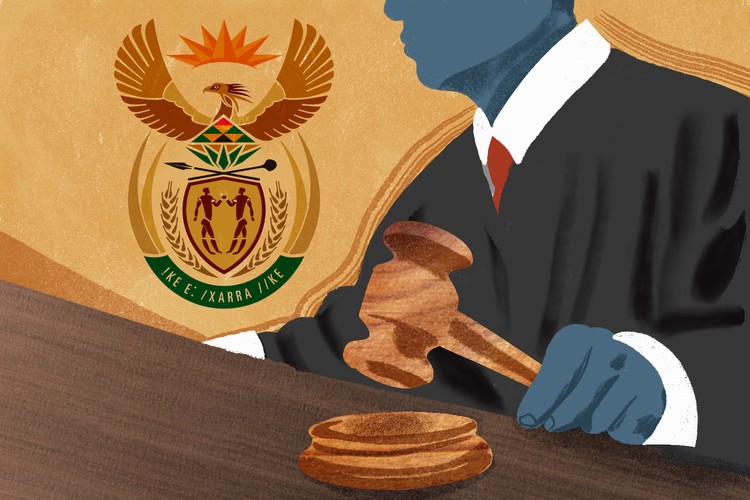
14 November 2025
Witnesses in court proceedings often risk their lives. Graphic: Lisa Nelson
In 2024, a 22-year-old mother of two was struck by a stray bullet during a gang shoot-out in Lavender Hill, on the Cape Flats. In 2024 she was subpoenaed to Wynberg Magistrates’ court as a witness to the incident, in which three people were killed. She is one of hundreds of witnesses caught in the crossfire of a collapsing judicial system.
“I felt totally exposed, and alone. There was no support or protection whatsoever,” she says.
“Even when I was home at night, gang leaders would drive past my house, firing bullets through my windows. My children and me had to cower under our beds for protection. Half the time, the police never even bothered to respond to my calls. And when they did, they only arrived the following morning.”
She eventually gave her evidence in a courtroom packed with gangsters and their families.
Two gangsters were convicted, and sentenced to lengthy prison terms. But she had to go through hell to get there.
A two-month probe into the running of criminal courts in Cape Town and the Western Cape highlights the violence, intimidation and death threats witnesses face and the never-ending postponements, the dockets which are “lost”, the hundreds of cases which are thrown out and the general sense of hopelessness among witnesses. We interviewed dozens of magistrates, prosecutors, accused people and witnesses, most of whom for obvious reasons did not want to be named.
An Elsies River woman said when she had to testify earlier this year against her then boyfriend, accused of repeated domestic violence, “it was more terrifying than the attacks themselves”.
“As soon as I arrived at court, I was confronted outside by my boyfriend’s family. I was pushed around, punched and threatened with my life. There were police officers there who saw what was happening, but no one stepped in to help me,” she said.
But her ordeal had only just begun.
Sitting in the court corridor with her boyfriend’s relatives and friends all around her, “was an absolute nightmare”. She said she was constantly threatened and abused and told that if she did not refuse to testify, her house would be burnt down and her children harmed.
This went on for six months, as the case was postponed nine times.
When the case was finally called, she said she was too terrified and traumatised to testify. The matter, like hundreds of others across Cape Town, was thrown out, and the accused walked free.
“My life was made a misery, and I still live in fear every single day,” she said.
The National Prosecuting Authority offers “tips” for witnesses (see gray box below). But most of these are meaningless without proper protection. In courtrooms across the city, witnesses recount stories of intimidation and harassment.
In many instances, they risk their lives in pursuit of justice, yet the justice system seems to have abandoned them, leaving them vulnerable to a system in which injustice all too often prevails.
A prosecutor at Bellville Magistrates’ Court says accused people receive “far more protection and understanding” than the victims of their crimes.
“We cannot continue like this,” he says. “The system needs to protect victims, and create a safe environment for them to testify against people accused of serious crimes. As things stand, victims are the people who suffer, and accused criminals laugh in their faces.”
A leading Cape Town criminal attorney agrees. “Witnesses are the most hard-done-by people in the criminal justice system. They are putting their lives on the line to obtain justice for all, while they themselves are the victims of blatant injustice,” she says.
She says calls for changes to the court system to recognise and protect the key role that witnesses play in the delivery of justice are constantly ignored.
“Witnesses are doing their civic duty. In many instances, they are putting themselves in grave danger. We need to find a way to protect them and enable them to deliver evidence in criminal cases without fear. Instead, criminals are the ones who are protected, and innocent witnesses are left to their own devices,” she says.
“We need special, secure areas for witnesses to sit while waiting to be called to give evidence. We cannot have a situation where witnesses share corridor benches with the people they are accusing.”
Witnesses should also be given protection on their way to and from court, she says.
“It is absurd that we should expect witnesses – many of whom are themselves victims in the cases concerned – to find their own way to and from court, unprotected. In what way is that justice? These people are at the heart of our justice system. Without them, we have no justice system.”
She also calls for increased security systems at courts.
“So many courts do not even have functioning metal (firearm) detectors at the entrance. People can walk in and out as they please.
“We need to understand that courts, by their very nature, are packed with accused – often hardened criminals. Why are we not protecting the brave witnesses prepared to give evidence against them?”
The NPA provides the “Witness Tips” below.
But most of these are meaningless without proper protection.